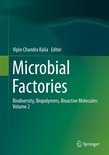Microbial Factories Biofuels, Waste treatment: Volume 1
Afbeeldingen
Sla de afbeeldingen overArtikel vergelijken
- Engels
- Hardcover
- 9788132225973
- 03 maart 2016
- 360 pagina's
Samenvatting
This book highlights the efforts made by distinguished scientific researchers world-wide to meet two key challenges: i) the limited reserves of polluting fossil fuels, and ii) the ever-increasing amounts of waste being generated. These case studies have brought to the foreground certain innovative biological solutions to real-life problems we now face on a global scale: environmental pollution and its role in deteriorating human health. The book also highlights major advances in microbial metabolisms, which can be used to produce bioenergy, biopolymers, bioactive molecules, enzymes, etc. Around the world, countries like China, Germany, France, Sweden and the US are now implementing major national programs for the production of biofuels. The book provides information on how to meet the chief technical challenges – identifying an industrially robust microbe and cheap raw material as feed. Of the various possibilities for generating bioenergy, the most attractive is the microbial production of biohydrogen, which has recently gained significant recognition worldwide, due to its high efficiency and eco-friendly nature. Further, the book highlights factors that can make these bioprocesses more economical, especially the cost of the feed. The anaerobic digestion (AD) process is more advantageous in comparison to aerobic processes for stabilizing biowastes and producing biofuels (hydrogen, biodiesel, 1,3-propanediol, methane, electricity), biopolymers (polyhydroxyalkanoates, cellulose, exopolysaccharides) and bioactive molecules (such as enzymes, volatile fatty acids, sugars, toxins, etc.) for biotechnological and medical applications. Information is provided on how the advent of molecular biological techniques can provide greater insights into novel microbial lineages. Bioinformatic tools and metagenomic techniques have extended the limits to which these biological processes can be exploited to improve human welfare. A new dimension to these scientific works has been added by the emergence of synthetic biology. The Big Question is: How can these Microbial Factories be improved through metabolic engineering and what cost targets need to be met?
This book highlights the efforts made by distinguished scientific researchers world-wide to meet two key challenges: i) the limited reserves of polluting fossil fuels, and ii) the ever-increasing amounts of waste being generated. These case studies have brought to the foreground certain innovative biological solutions to real-life problems we now face on a global scale: environmental pollution and its role in deteriorating human health. The book also highlights major advances in microbial metabolisms, which can be used to produce bioenergy, biopolymers, bioactive molecules, enzymes, etc. Around the world, countries like China, Germany, France, Sweden and the US are now implementing major national programs for the production of biofuels. The book provides information on how to meet the chief technical challenges – identifying an industrially robust microbe and cheap raw material as feed. Of the various possibilities for generating bioenergy, the most attractive is the microbial production of biohydrogen, which has recently gained significant recognition worldwide, due to its high efficiency and eco-friendly nature. Further, the book highlights factors that can make these bioprocesses more economical, especially the cost of the feed. The anaerobic digestion (AD) process is more advantageous in comparison to aerobic processes for stabilizing biowastes and producing biofuels (hydrogen, biodiesel, 1,3-propanediol, methane, electricity), biopolymers (polyhydroxyalkanoates, cellulose, exopolysaccharides) and bioactive molecules (such as enzymes, volatile fatty acids, sugars, toxins, etc.) for biotechnological and medical applications. Information is provided on how the advent of molecular biological techniques can provide greater insights into novel microbial lineages. Bioinformatic tools and metagenomic techniques have extended the limits to which these biological processes can be exploited to improve human welfare. A new dimension to these scientific works has been added by the emergence of synthetic biology. The Big Question is: How can these Microbial Factories be improved through metabolic engineering and what cost targets need to be met?
Productspecificaties
Inhoud
- Taal
- en
- Bindwijze
- Hardcover
- Oorspronkelijke releasedatum
- 03 maart 2016
- Aantal pagina's
- 360
- Illustraties
- Nee
Betrokkenen
- Hoofdauteur
- Kalia Vipin Chandra
- Hoofdredacteur
- Vipin Chandra Kalia
- Hoofduitgeverij
- Springer, India, Private Ltd
Overige kenmerken
- Editie
- 1st ed. 2015
- Extra groot lettertype
- Nee
- Product breedte
- 182 mm
- Product hoogte
- 22 mm
- Product lengte
- 261 mm
- Studieboek
- Nee
- Verpakking breedte
- 178 mm
- Verpakking hoogte
- 254 mm
- Verpakking lengte
- 254 mm
- Verpakkingsgewicht
- 807 g
EAN
- EAN
- 9788132225973
Je vindt dit artikel in
- Taal
- Engels
- Boek, ebook of luisterboek?
- Boek
- Studieboek of algemeen
- Algemene boeken
Kies gewenste uitvoering
Prijsinformatie en bestellen
Alle bindwijzen en edities (2)
-
137,99Direct beschikbaar
-
137,99Direct beschikbaar
Rapporteer dit artikel
Je wilt melding doen van illegale inhoud over dit artikel:
- Ik wil melding doen als klant
- Ik wil melding doen als autoriteit of trusted flagger
- Ik wil melding doen als partner
- Ik wil melding doen als merkhouder
Geen klant, autoriteit, trusted flagger, merkhouder of partner? Gebruik dan onderstaande link om melding te doen.

